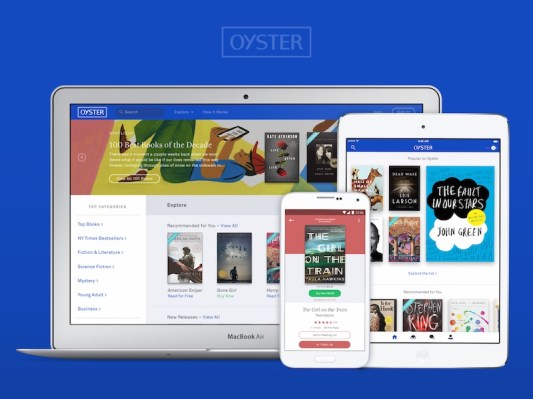Oyster launched a couple of years ago as a Netflix-style service for e-books, charging $9.95 a month for unlimited access to a library that has grown to more than 1 million titles. Today it’s expanding that model by launching its own e-book store.
To be sure, if you just want to buy e-books one-by-one, I hear there are a few places where you can already do that. However, co-founder and CEO Eric Stromberg suggested that the store will allow Oyster to offer a truly comprehensive selection of books to its readers.
Stromberg and co-founder Willem Van Lancker (Oyster’s chief product officer) gave me a demo of the updated app last week. The interface isn’t changing dramatically — you’ll just see a much wider selection of books, with titles available via subscription displayed side-by-side with those that are only available for individual purchase. (If you only want to see books that are available as part of your subscription, there’s a filter for that.)
One way to think about this is to go back to the Netflix comparison — sure, I do most of my online movie and TV viewing on Netflix, but if the service doesn’t have something I really want to watch, then I’ll consider buying it iTunes or elsewhere. With Oyster, everything’s available in one place, even if you have to pay for it in different ways.
And it sounds like truly comprehensive selection is Stromberg’s goal — he said readers should be able to find “virtually any book on Oyster.” In fact, the e-book store is launching with all of the Big Five publishers in the United States on-board, namely Hachette, HarperCollins, Macmillan, Penguin Random House, and Simon & Schuster. (Three of those publishers had already made some of their titles available to Oyster subscribers.)
This completeness has other benefits. Van Lancker noted that Oyster has been highlighting books through its own editorial efforts, most notably through its magazine The Oyster Review and now it can discuss a much broader range books. (See for example its new list of the 100 best books of the decade so far.)
Stromberg added that as more publishers move towards agency pricing (where the publisher, rather than the retailer, sets the price), it’s harder for someone like Amazon to beat everyone by cutting prices: “We expect there to be a lot more price parity in the marketplace, so it will be harder to compete just based on price.”
Competitor Scribd, by the way, also sells e-books individually, but it says it’s focused on the subscription model.
